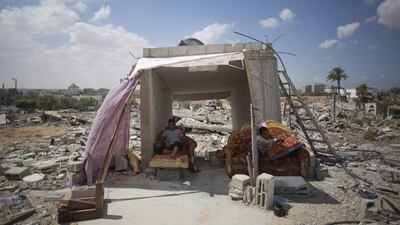For 50 days the bombardment of Gaza was the world’s top news story, prompting protest marches around the world and angry media battles. Three weeks ago both sides agreed an open-ended ceasefire and since then – nothing. That is not to say that the pain of the bereaved, the homeless and dispossessed is any less acute, or that their supporters around the globe have forgotten.
But the news caravan has moved on to Iraq. And this has provided an opportunity for diplomats to return to business as usual. This inaction is a result of the Israeli principle of “quiet for quiet” – if Hamas stops launching its feeble and unguided rockets, the people of Gaza will no longer be bombed back to the Middle Ages.
Quiet for quiet is the Israeli side of the story. In reality it is quiet in exchange for the continued closure of Gaza, which has continued for eight years but got dramatically worse with the new Egyptian government’s destruction of the tunnels that facilitated a thriving blockade-running economy. Obviously this situation contains the seeds of more violence in future.
But when diplomats gather and the subject turns to Palestine, if it ever does, they examine their manicured nails. There is nothing that anyone can think of to say or do. As for the donor community, they are preparing for a conference in Cairo next month to rebuild Gaza. But why should they spend their taxpayers’ money rebuilding things that will be smashed to smithereens in a few months, as has happened three times before?
According to the charity Medical Aid for Palestinians, the need is extraordinary. In addition to the long-term medical requirements of the injured, there are 100,000 homeless, with 18,000 homes destroyed and 67 clinics and hospitals damaged or levelled. The water and sewage networks are ruined and mains power is functional for barely six hours a day.
One man who is not examining his fingernails is Sir Vincent Fean, a British diplomat who has just retired from the post of Consul-General in Jerusalem.
On Wednesday he published an appeal to the British government to join the 134 countries that have recognised the state of Palestine. He argues that where Britain leads, the rest of Europe will follow, and the balance of power in the UN Security Council will change.
Besides, as the state that issued the Balfour Declaration and incorporated it into its mandate to rule Palestine in 1920, Britain has a deep moral responsibility. The wording of that League of Nations mandate talks of Britain’s “sacred trust of civilisation” to guide the Palestinians to independence. An unfulfilled promise if ever there was one.
Britain has accepted that Palestine “largely fulfils the legal and technical criteria of UN membership, including statehood, as far as the occupation allows”. But London is holding back from recognition while it waits for the moment when it will best help peace. That may never come: John Kerry, US secretary of state, said last year that time would run out in 2015.
The point of this gesture would be to show the Palestinians that there is a route to statehood which does not involve violence. This route, after the collapse of Mr Kerry’s attempt to breathe life into the “peace process”, does not exist elsewhere. It would offer some encouragement to the fragile so-called unity government of Fatah and Hamas. This unity exists only on paper.
Most important, recognition could not be interpreted as a reward for Hamas, something that both Israel and Egypt are determined not to provide. Rather than that, it is an encouragement to the Palestinian movement as a whole. Britain has a long-standing practice of not recognising governments but states. And since it recognised Israel, it should have no qualms about recognising a state with ill-defined borders. While Israel would not welcome it, the move can hardly be seen as a hostile act.
This is not the only idea being floated in London. Professor Rosemary Hollis, a prominent commentator on Middle East affairs, surprised an audience at the Chatham House think tank this week by proposing that donor countries should take over the Gaza Strip under a mandate from the UN secretary general. Taking at face value Israel’s word that it has nothing to do with Gaza, and ignoring the claims of Egypt and the Palestinian national movement, the donors should build a sea port, start developing offshore gas deposits and provide Gaza with an economy beyond home-made rockets.
Without such drastic action, Professor Hollis said Gaza would become unlivable in a few years, with a fast growing population, a depleted water supply and agriculture curtailed by the Israeli buffer zone along the border. One day the world would wake up and discover a humanitarian catastrophe in Gaza as dramatic as the threatened massacre of the Yazidis in northern Iraq that shocked the world last month.
Prof Hollis gets full marks for original thinking. But would Israel actually allow Gaza to slip out of its control? Unlikely. There is no sign of Israeli politicians feeling urgent pressure to solve the problems of Palestine. For the moment, Gaza seems manageable with the tactic of siege and bombardment, and the West Bank with the combination of security coordination by day and army raids by night. While not perfect from the Israeli point of view, this combination ensures that the split in Palestinian ranks remains a gaping wound.
Vincent Fean is right in proposing something that aims, against all odds, to promote the unity government and give heart to that dwindling number of Palestinians who still believe in statehood.
The British government is not going to take even this small step. But the hope is to embed the idea in the minds of British political parties and ensure it gets in their manifestos. It is time. This initiative will at least show that the status quo cannot continue.
Alan Philps is a commentator on global affairs
On Twitter@aphilps

